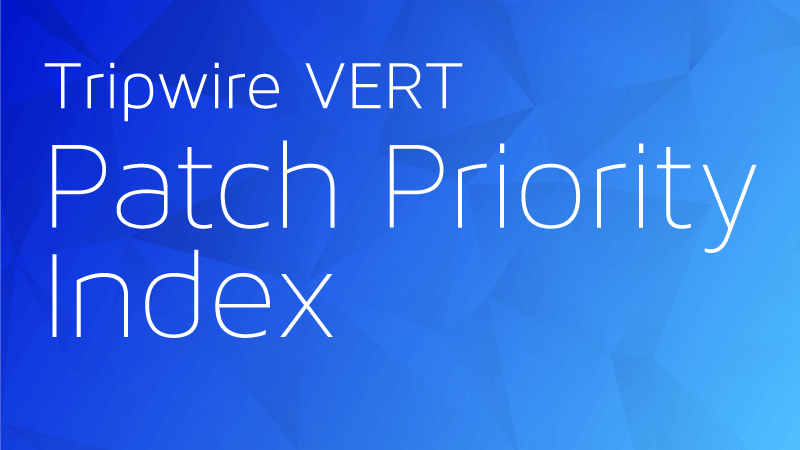
Tripwire's June 2019 Patch Priority Index (PPI) brings together important vulnerabilities from Microsoft, Oracle, and Adobe. First and most importantly this month are patches available to resolve 2 deserialization vulnerabilities in Oracle WebLogic. These vulnerabilities are identified as CVE-2019-2725 and CVE-2019-2729. Both of these vulnerabilities allow remote code execution over a network and without authentication. CVE-2019-2725 impacts Oracle WebLogic Server, versions 10.3.6.0, 12.1.3.0 and CVE-2019-2729 impacts Oracle WebLogic Server, versions 10.3.6.0.0, 12.1.3.0.0, 12.2.1.3.0 Next on this list is a patch for Adobe Flash Player. Adobe has released security updates for Adobe Flash Player for Windows, macOS, Linux and Chrome OS. These updates address a critical Use-After-Free vulnerability in Adobe Flash Player. Successful exploitation could lead to arbitrary code execution in the context of the current user. Up next on the patch priority list this month are patches for Microsoft's Browser and Scripting Engine. These patches resolve 19 vulnerabilities, including fixes for Memory Corruption, Security Feature Bypass, and Information Disclosure vulnerabilities. Next on the list are patches for Microsoft Word. These patches resolve 2 vulnerabilities, including fixes for Remove Code Execution vulnerabilities. Up next are patches for Microsoft Windows. These patches address numerous vulnerabilities across Windows Kernel, Jet Database Engine, GDI, Unified Write Filter, Hyper-V, NTLM, Secure Kernel Mode, Shell, Storage Service, User Profile Service, Event Viewer, Task Scheduler, IIS, Speech API, Local Security Authority Subsystem, DirectX, ActiveX, and Comctl32. These patches fix 61 vulnerabilities, including Elevation of Privilege, Information Disclosure, Security Feature Bypass, Denial of Service, and Remote Code Execution vulnerabilities. Finally this month, administrators should focus on server-side patches available for Microsoft SharePoint, Skype for Business and Lync Server. These patches resolve 5 vulnerabilities, including Cross-site Scripting (XSS) and Denial of Service vulnerabilities.
| BULLETIN | CVE |
| Oracle Security Alert Advisory - CVE-2019-2725 | CVE-2019-2725 |
| Oracle Security Alert Advisory - CVE-2019-2729 | CVE-2019-2729 |
| APSB19-30: Adobe Flash Player CVE-2019-7845 | CVE-2019-7845 |
| Browser | CVE-2019-1081, CVE-2019-1038, CVE-2019-1054 |
| Scripting Engine | CVE-2019-1002, CVE-2019-1003, CVE-2019-0991, CVE-2019-0993, CVE-2019-1024, CVE-2019-0992, CVE-2019-0989, CVE-2019-1052, CVE-2019-1051, CVE-2019-0990, CVE-2019-1023, CVE-2019-1005, CVE-2019-1080, CVE-2019-0988, CVE-2019-0920, CVE-2019-1055 |
| Microsoft Office | CVE-2019-1035, CVE-2019-1034 |
| Windows | CVE-2019-0888, CVE-2019-1043, CVE-2019-1018, CVE-2019-0908, CVE-2019-0909, CVE-2019-0906, CVE-2019-0907, CVE-2019-0904, CVE-2019-0905, CVE-2019-0974, CVE-2019-0972, CVE-2019-0941, CVE-2019-0985, CVE-2019-1019, CVE-2019-1069, CVE-2019-0960, CVE-2019-1017, CVE-2019-1014, CVE-2019-0943, CVE-2019-1007, CVE-2019-1028, CVE-2019-1022, CVE-2019-1021, CVE-2019-1026, CVE-2019-1027, CVE-2019-0984, CVE-2019-0959, CVE-2019-1025, CVE-2019-1064, CVE-2019-0948, CVE-2019-1009, CVE-2019-0968, CVE-2019-1050, CVE-2019-1048, CVE-2019-1015, CVE-2019-1049, CVE-2019-1046, CVE-2019-1047, CVE-2019-1016, CVE-2019-1013, CVE-2019-1012, CVE-2019-1011, CVE-2019-1010, CVE-2019-0977, CVE-2019-0710, CVE-2019-0713, CVE-2019-0711, CVE-2019-0620, CVE-2019-0722, CVE-2019-0709, CVE-2019-0973, CVE-2019-1065, CVE-2019-1041, CVE-2019-1039, CVE-2019-1040, CVE-2019-1045, CVE-2019-1044, CVE-2019-1053, CVE-2019-0998, CVE-2019-0983, CVE-2019-0986 |
| SharePoint | CVE-2019-1031, CVE-2019-1032, CVE-2019-1036, CVE-2019-1033 |
| Skype for Business and Lync Server | CVE-2019-1029 |
To learn more about Tripwire’s Vulnerability and Exposure Research Team (VERT), click here. Or you can follow VERT on Twitter: @tripwirevert

